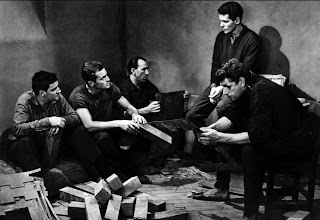Film:
You Can’t Take It with You
Format: DVD from Rockford Public Library on laptop.

At the start of the year I decided to watch everything that had ever won Best Picture at the Oscars. It was an easy decision, seeing that finishing off The List put me within shouting distance and picking up a few others here and there brought me even closer. It was, on an already packed list, a few extra weeks of viewing. And I figured I may as well put up a review of all of them, too. Really, what’s 20,000 words, more or less. It occurs to me, though, that there’s a reason many of the films that won this particular award are no longer considered “must-see” films. And so we have 1938’s winner, You Can’t Take It with You, another big winner that has justifiably sunk into obscurity.
In the finance world, no one has the clout of Anthony P. Kirby (Edward Arnold). He’s working on a major deal that requires that he buy up 12 city blocks worth of buildings, and he’s managed to do this with the exception of a single house. That house is owned by Martin “Grandpa” Vanderhof (Lionel Barrymore), and there’s no way he’ll sell. He lives there with his collection of eccentric relatives and friends, each of whom does whatever he or she pleases at any given time, regardless of its quality, value, or use to the world at large. They’re sort of half commune and half open-door lunatic asylum, and they’re always recruiting new members.



























